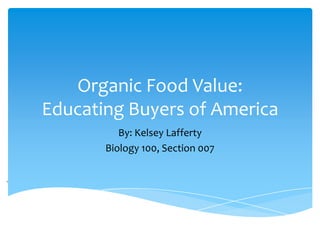
Finished podcast
- 1. Organic Food Value: Educating Buyers of America By: Kelsey Lafferty Biology 100, Section 007
- 2. What are Organic Foods? Organic Foods have a list of prerequisites they must meet to be qualified as organic foods… No pesticides can be used currently or in the past three years No growth hormones Pests, weeds and diseases are managed by biological or physical controls Animals must be provided with access to outside Organic farmers must apply for certification from the government
- 3. History of Organic Farming The term organic farming came from Lord Northbourne’s book, Look to the Land in 1940 1990- $1 billion food consumption 2008- $21.1 billion 2009- $23 billion 2012- estimated to be much higher
- 4. Question Are organic foods actually better for you than conventionally grown foods?
- 5. What people think about Organic Foods..
- 6. Benefits of Organic Foods Less pesticides found Higher levels of vitamin C, iron, magnesium and phosphorous - reported by a study done by Worthington (2001) Greater levels of antioxidant chemicals Consumption of diary makes significant difference in health outcomes for allergic dermatitis 1/3 of chemical residues compared to conventionally raised foods
- 7. Pesticides 70% of consumers have said they purchased organic foods to avoid pesticides Less pesticides found in organic than conventionally raised foods Pesticides can kill plants; people do not want to be consuming them Studies show most pesticides do not lead to health concern Occupational exposure present a greater health risk than consumer exposure to pesticides
- 8. Negatives Results are greatly affected by the length of time a plot is organically farmed Local geography Weather patterns Ground cover More land required Studies that prove health benefits are scarce; implied health benefit Price is much HIGHER than conventionally grown foods
- 9. Organic foods, why people don’t buy Cost Convenience Availability Food is not as appealing because they do not get polished and may spoil quicker
- 10. Studies about Organic Foods Woese and others reported on 150 studies of many different foods that there were no major nutrient level differences between organic and conventionally grown foods Lockie claimed from his study that organic foods have less pesticide residue, but has no added vitamin or mineral content Lockie study found that people with higher education and higher incomes tend to purchase organic
- 11. What to consider when shopping Organic foods Conventionally grown Easier to get in season foods: from a local farmer ✳Less expensive Reduction of pesticides ✳Available all season More costly ✳Potential for more May not look as appealing pesticide use and residue (less shiny apples) but ✳Contains primarily same does not mean it is not nutritional value as delicious organic
- 12. Conclusions Organic foods are healthy, but the benefits do not completely outweigh conventional food There have not been enough tests to prove that organic food has a statistically significant health benefit compared to conventionally grown food Organic foods are not necessarily better for you and do not give you any more nutrients than conventional foods It is the perception that organic provides added health benefits that gets people to buy them
- 13. Works Cited http://www.altmedrev.com/publications/15/1/4.pdf Walter J. Crinnion, ND http://pediatrics.aappublications.org/content/130/5/e1406.full. pdf+html Joel Forman, Janet Silverstein http://onlinelibrary.wiley.com/doi/10.1111/j.1750- 3841.2006.00196.x/full Carl K. Winter, Sarah F. Davis http://europepmc.org/abstract/MED/20359265/reload=0;jsessi onid=F4BeOLVWYlUYesfISLdQ.4 Clinton WJ